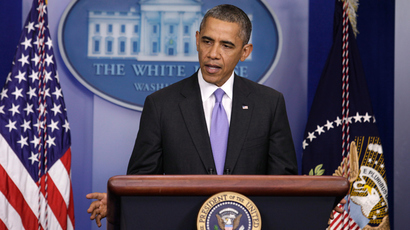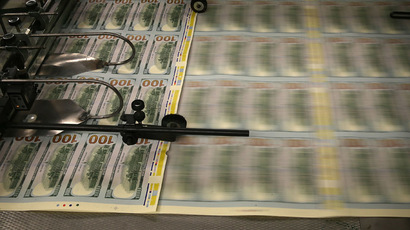US avoids default as Congress passes deal to end shutdown
US President Barack Obama has signed legislation passed by Congress Wednesday to temporarily lift the debt ceiling and end the government shutdown, averting the threat of default just hours before the October 17 deadline.
The legislation funds the government through to January 15 and lifts the $16.7 trillion debt ceiling until February 7. The White House budget director, Sylvia Mathews Burwell, said she has issued a directive to all government employees to return to work.
The 16-day budget crisis has subtracted an estimated $24 billion in from the American economy and triggered a flurry of criticism from major foreign lenders and domestic business captains.
As promised, Obama signed the legislation shortly after it was passed in the House of Representatives.

As indicated before the US Senate vote, Republican House Speaker John Boehner did not block the fiscal deal from moving on, and it passed by a vote of 285-144 in the lower chamber.
The measure was supported by every Democratic member of the House, but was rejected by a sizeable portion of Boehner’s GOP caucus.
Conservative Republicans were nearly unanimous in their opposition to the plan, as the federal health care law – the Affordable Care Act, or Obamacare – they so object to will go virtually unscathed after all.
The Senate approved the proposal by a vote of 81-18 earlier on Wednesday evening.
Senate Majority Leader Harry Reid and Minority Leader Mitch McConnell spent previous days constructing a deal as the House failed to come to an agreement on a proposal Tuesday.
“This compromise we reached will provide our economy with the stability it desperately needs. It’s never easy for two sides to reach consensus. It’s really hard, sometimes harder than others. This time was really hard,” Reid said ahead of the vote. “The country came to the brink of a disaster. But in the end, political adversaries set aside their differences and disagreement to prevent that disaster."
Republicans Senators Ted Cruz, Rand Paul and Marco Rubio were among the 18 'nay' votes in the Senate.
"This is a terrible deal," said Senator Ted Cruz on the Senate floor before the vote. "This deal embodies everything about the Washington establishment that frustrates the American people."
President Obama said in a statement after the Senate vote that Washington must begin to gain back the trust of voters given that more confrontations on debt, governmental budgeting, and other issues await.
"Hopefully next time, it won't be in the eleventh hour. We've got to get out of the habit of governing by crisis,” Obama said.

The US Treasury’s authority to borrow money to pay down US debt
obligations was scheduled to end Thursday, October 17. With no
full spending bill from Congress, many government operations have
been on hold since October 1.
The 16-day government shutdown has cost the US $1.7 billion per week in lost economic output, according to a study by IHS Global Insight, a Massachusetts-based research firm. The S&P ratings agency declared Wednesday the shutdown has subtracted $24 billion from the US economy, cutting 0.6 percent from the fourth quarter GDP growth.
Major US creditors like China - which holds $1.3 trillion in US Treasuries - have openly discussed “de-Americanizing” as the crises-hopping US government has become increasingly volatile to the world economy. China has introduced a so-called “haircut," or a discount, on the value of US Treasuries held as collateral against futures trades.
Developing and developed nations are equally concerned, and institutions like the World Bank and the International Monetary Fund (IMF) have issued several warnings.
Some US business leaders are too voicing their discontent with Washington’s political turmoil.
"Most CEOs I speak to in the United States say they're seeing a slowdown in business because of this," Laurence Fink, the CEO of giant asset manager BlackRock Inc, told Reuters in an interview on Wednesday.
"I was on a conference call with many of them, and I heard across the board, a slowdown from the American consumer because of this narrative, so it's having an impact on our economy already – and it's going to have an impact on job creation at a time when we need more job creation," he added

Upon news of a deal, the Dow Jones Industrial Average shot up by more than 200 points.
“Investors are relieved that it looks like we’re not going to go over the cliff,” Ben Hart, a research analyst at the Pennsylvania-based Haverford Trust Co., told Bloomberg News. “It takes the worst case scenario off the table.”
The Senate deal will provide back pay to furloughed government workers and will allow the US Treasury to pay US debt bills should Congress not come to an agreement on the ceiling by February 7.
In addition, the deal comes with an income verification requirement for anyone receiving health insurance subsidies under the Affordable Care Act.














